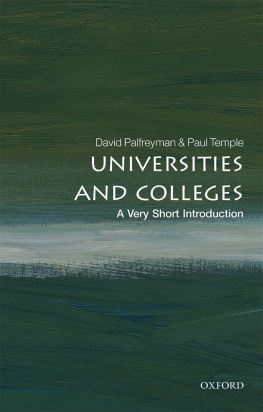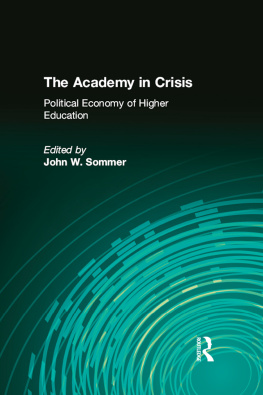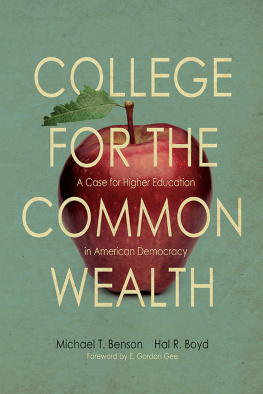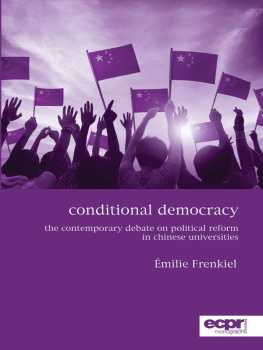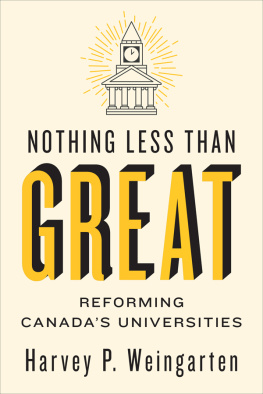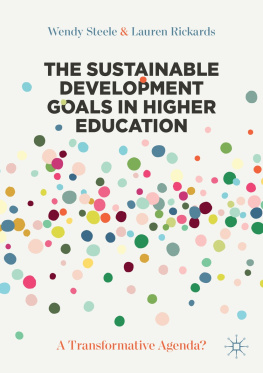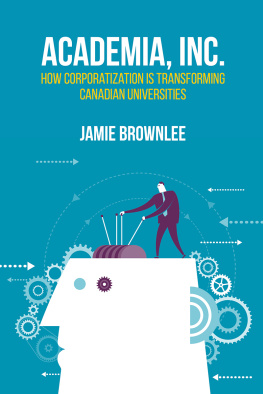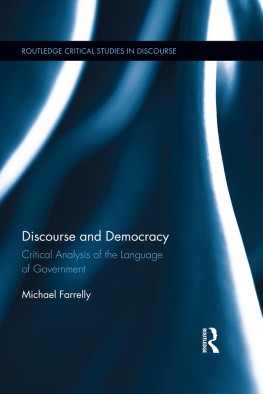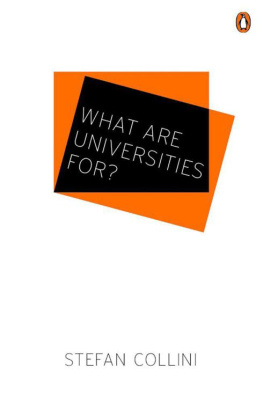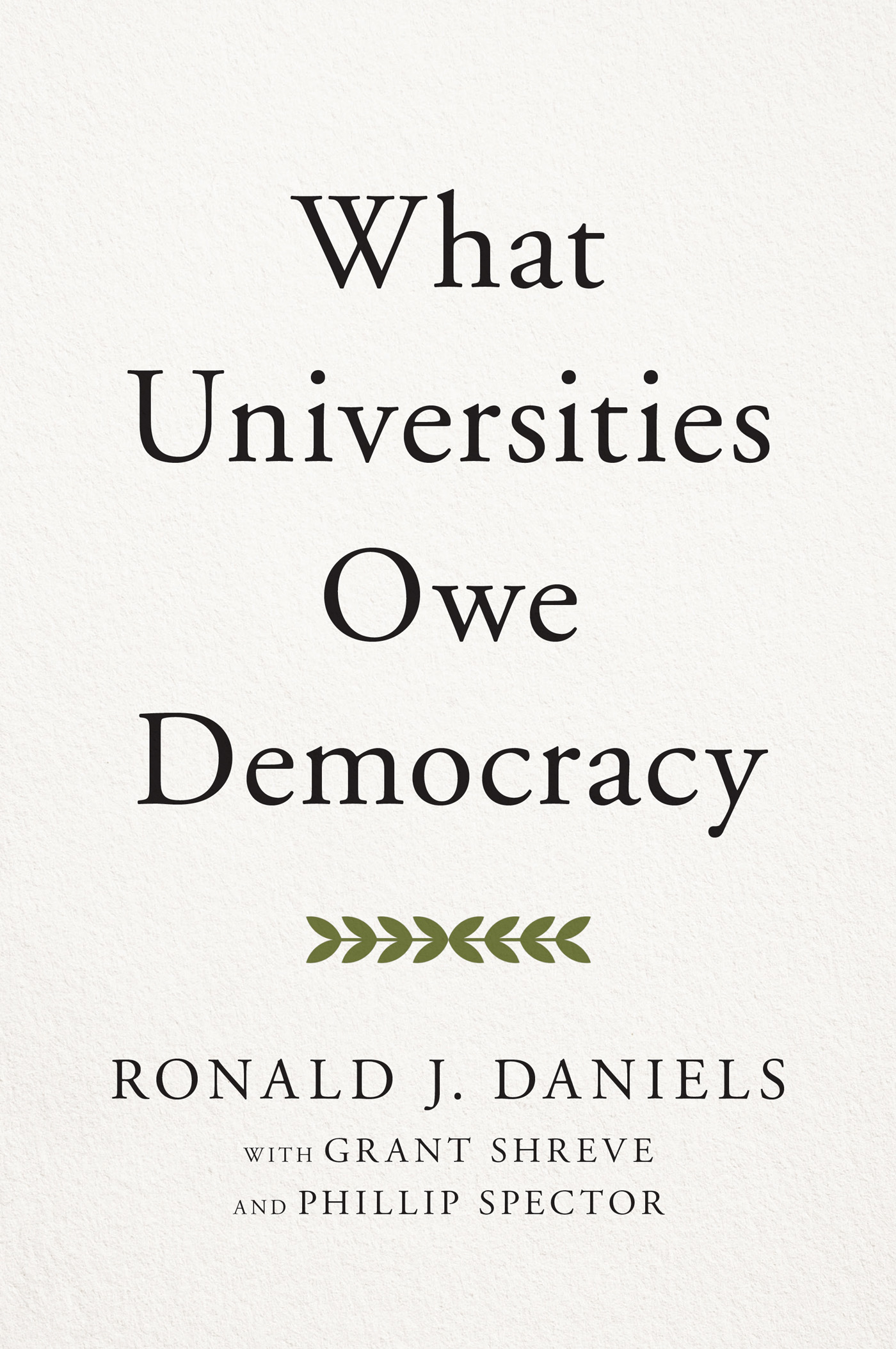Contents
Guide
American colleges and universities are being tested like never before in their commitment to inquiry and dialogue that is as open as it is diverse. As the son of a Jewish refugee who fled Poland in 1939, Ronald Daniels insights on the essential role of colleges in a democracy ring with particular power. He offers a compelling history of the important relationship between higher education and democratic valuesand a path forward to strengthen both.Michael R. Bloomberg, founder of Bloomberg LP and Bloomberg Philanthropies, and Mayor of New York, 20022013
Weaving personal history with his passion for democracy, Daniels has crafted a beautifully written story of the essential role of universities in maintaining and reinforcing fairness and justice in America. To discover the new role universities must play in the contest between liberal and illiberal ways of thought, and how institutions of higher learning need reform, read this essential book. There is no other like it.Jonathan R. Cole, author of The Great American University
Ron Daniels is a pioneer. In this critically important work, he examines the systemic and systematic reforms we need to achieve equity in US higher education. There has never been a more urgent moment for change.Mellody Hobson, Co-CEO and President, Ariel Investments, LLC
In this timely and compelling book, Ronald Daniels makes a powerful argument for the central role universities must have in ensuring the public good and fostering liberal democracy. Readers will appreciate his careful analysis, his global perspective, and his inspiring personal story, and they will come away understanding the urgency of his message.Freeman A. Hrabowski III, President of University of Maryland, Baltimore County / author of The Empowered University: Shared Leadership, Culture Change, and Academic Success
One of Americas outstanding university presidents dares to tackle what ails US higher education. His recommendations are radical, exciting, and doable. This is one of those books that will define the conversation on campuses across the country.Michael Ignatieff, President and Rector of Central European University
Educating our citizens to think critically is more important than ever, a case made convincingly by Ronald Daniels. Its not enough for universities to teach; they must actively defend and cultivate the openness and debate that compose the foundation of a free society. The methods to defend democracy must be taught, and What Universities Owe Democracy is our textbook.Garry Kasparov, Chairman, Renew Democracy Initiative / former World Chess Champion
Daniels rivets attention on the obligation of universities when democracy is in global retreat and provides specific, illustrative changes needed, not just to improve education and research but to tackle mounting distrust of journalism and science. This book is essential for any who care about the prospects for social trust, truth-seeking, and the promise of America.Martha Minow, 300th Anniversary University Professor and former dean of Harvard Law School
An exceptionally important, insistently reasonable, delightfully readable book, even if [Danielss] views sometimes differ from mine.Bret Stephens, New York Times columnist
What Universities Owe Democracy

What Universities Owe Democracy

RONALD J. DANIELS
WITH GRANT SHREVE
AND PHILLIP SPECTOR

Johns Hopkins University Press
BALTIMORE
2021 Johns Hopkins University Press
All rights reserved. Published 2021
Printed in the United States of America on acid-free paper
2 4 6 8 9 7 5 3
Johns Hopkins University Press
2715 North Charles Street
Baltimore, Maryland 21218-4363
www.press.jhu.edu
Library of Congress Cataloging-in-Publication Data
Names: Daniels, Ronald J. (Ronald Joel), 1959 author. | Shreve, Grant, 1984 author. | Spector, Phillip, 1976 author.
Title: What universities owe democracy / Ronald J. Daniels ; with Grant Shreve and Phillip Spector.
Description: Baltimore : Johns Hopkins University Press, 2021. | Includes bibliographical references and index.
Identifiers: LCCN 2021017904 | ISBN 9781421442693 (hardcover) | ISBN 9781421442709 (ebook)
Subjects: LCSH: Education, HigherAims and objectivesUnited States. | Democracy and educationUnited States.
Classification: LCC LA227.4 .D36 2021 | DDC 378.73dc23
LC record available at https://lccn.loc.gov/2021017904
A catalog record for this book is available from the British Library.
An Open Access edition of this book is hosted by Project MUSE and is licensed under a Creative Commons Attribution-NonCommercial-No Derivatives 4.0 International License, CC BY-NC-ND.
ISBN 9781421444307 (ebook open access)
All proceeds from sales of the book go to Johns Hopkins University Press to fulfill its mission of advancing and disseminating knowledge to the world.
Special discounts are available for bulk purchases of this book. For more information, please contact Special Sales at .
PREFACE
I AM THE SON of a European Jewish refugee who, along with his parents and two siblings, entered Canada from Warsaw, Poland, in March 1939, narrowly escaping the cataclysm that engulfed European Jewry. Not one of the scores of my fathers relatives who remained in Europegrandparents, aunts and uncles, cousinssurvived. What makes the story of my fathers great good fortune all the more remarkable was the studious indifference of the Canadian government toward European Jews from the time of Hitlers seizure of power in 1933 to the end of the Second World War in 1945. This indifference was memorably captured in the curt, chilling reply of a government official to the question of how many European Jews Canada would allow into the country: None is too many. In total, during this twelve-year period, Canada accepted only five thousand Jewish refugees, which historians Irving Abella and Harold Troper deemed the worst record of any refugee-admitting country in the world. My family constituted five of those five thousand.
The framed passport of my father and grandfather, along with their entry visa to Canada, continues to hang in my parents home in Toronto. It stands as a powerful reminder of the terrifying nightmare my family left behind in a continent riven by despotism, violence, and organized hatred; of the blissful succor they eventually found in Canada; and of the disquieting knowledge that autocracy underpinned by bigotry and an indifference to human life is never as far away as we would like to believe. A reminder, in short, that liberal democracy can never be taken for granted.
For my family, life in democratic Canada became inseparable from the bounties of higher education. It was here that my father, my aunt, and my uncle obtained degrees at the University of Toronto. I would later receive my undergraduate and law degrees from there, too. Universities made possible the promises of democracy. It is, in part, why I have dedicated my career to them.
It is hard for me not to wax quixotic about the role of universities. For more than four decades, I have inhabited several universities in different capacitiesstudent, professor, dean, provost, and, most recently, president. In each of these roles, I have felt privileged to be able to work in an institution that is truly a place apart. A place where, at its best, reason and fact are venerated; where individual acts of imagination and insight that challenge orthodoxies receive support and encouragement; where ideas are hatched that change our understanding of the world around us, bring us closer to truth, and offer the prospect of human advancement. It is a place where fellow citizens from all walks of life can transcend their circumstances through the acquisition of knowledge and the cultivation of mastery, and where scientific investigation generates technologies and therapies that materially improve human flourishing. And so it will come as little surprise that there is seldom a moment of doubt around my decision to devote my life to this most extraordinary institution.


